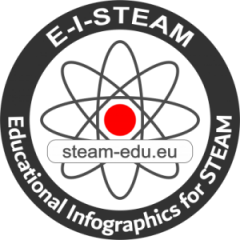As teachers, we need to be aware of the changes and the needs of the today’s students. We have noticed that these generations of students have low-attention disorders, just because they are born with the technology. They are used to get to the information in just one click on their phones, tablets, and computers, so being in the classroom, being taught in a traditional way, by old textbooks, shows that the educational system is not efficient. According to the learning patterns and students’ needs, this project intends to develop visual materials that will help students understand the challenging topics in the students’ books.
Project’s objectives
- to create teaching methods through various innovative approaches;
- to engage students in activities that will encourage their interest in STEAM;
- to increase the level of knowledge in the key-competences;
- to provide excellent, hands-on learning opportunities for every student;
- to promote internationalization and European values;
Number and profile of participants
Each of the partner organizations in this Partnership are experienced in the field of teaching and education and they will contribute to a great extent for the realization of the proposal. There is a total number of about 30 key persons that will be included with working assignment, training activities with students, implementation and dissemination.
Activities
- selection of staff involved in the project, quality assurance, budget control and time management, risk management, acquisitions, financial reports, archiving, reporting to the National Agency and European Commission
- intellectual outputs: database of the current topics and areas that students find difficult and challenging in subjects like Math, Biology, Chemistry, Technology, Physics, Educational Infographics for STEAM – a toolkit and booklet on a platform, a Guidebook, and development of a structured course for how to use the Toolkit and the booklet
- a short-term students’ exchange (October 2020, Romania)
- three multiplier events (1 in Italy, 1 in Cyprus and 1 in Portugal)
- three transnational project meetings (Spain, Italy and Cyprus)
- dissemination activities (within the institutions involved in the project, in other institutions, public events and mass media coverage, publications and scientific events, graphic materials and online dissemination).
Methodology
- establishment of a communication network, organizational upgrades, informative activities, selection and preparation of participants, specific rules and financial regulations.
- analysis of the achievement results in all the partner schools that will direct us to development of the intellectual outputs, based on innovation and exchanges of practices; the process will be evaluated and redirected during the transnational project meetings.
- follow up phase with multiplier events and direct activities with the target groups: pupils, teachers, trainers, school managers, decision makers and policy makers, representatives of public institutions, including NGOs.
- dissemination phase with previously defined activities in a dissemination plan
- completion of the project with establishing specific tasks of each partner in the sustainability period, reinforcing the partnership and inviting new partners, planning additional activities
Results
The main results of the project are the already mentioned as intellectual outputs, other results are:
- at institutional / organizational level: developing innovative strategies to implement this method in the curricula based on the intellectual outputs and on the experience and expertise gained from the project;
- activities with the beneficiaries: implementing the methodology developed through this project in at least 20 schools in all participating countries, with at least 1000 pupils, 100 teachers and 100 parents and family members attending;
- at inter-institutional level: partnerships with similar institutions and schools to use the Educational Infographics for STEAM and the Guidelines
Impact
- 1. impact on the participants: Increased awareness of the importance of the key-competences, increased knowledge of using and learning from visual contents, increased learning and teaching methodologies and pedagogical approaches,
- impact on the participating organizations: Increased resources for using innovative methods, opportunities for professional development, and internationalization
- impact on target groups: increased knowledge in the key competences and better results on the PISA tests, and learning through the innovative approach
The potential long-term benefits
- STEAM awareness in the schools and community
- implementation of the Educational infographics methodology in the curricular and extra-curricular activities
